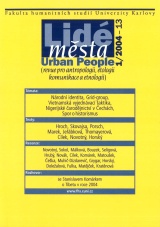Poslužte si svým rozumem!
DOI:
https://doi.org/10.14712/12128112.4351Abstrakt
This article investigates the possible prophetical level of Kanťs philosophy. Such prophecy doesn't mean a simple theory. It hits the totality of being, which itself is its source. The question of Kanťs prophecy is the question of Kanťs substantial intentions and ideals. The use of understanding is connected to the problems of freedom and of maturity. The ideal of freedom and of the use of understanding comes out of another, fundamental, ideals of the realm of purposes or morals. It is the ideal of perfect moral coexistence of people as rational beings. The human rationality (i.e. the human essentiality itself), in its theoretical use, gets at limits in cognition - at ideas. These limits provoke the passage to the practical use of understanding. This understanding expresses itself in the action it determines. Such action is then the causality of morally criticizable freedom. Moral actions are stimulated by the respect to the moral principles. Morality relates always to principles, not to arbitrariness. The autonomous, moral principle, which can determine any possible action, is the categorical imperative. The object, realized by this action, can, basically, be either good or evil. The only real good is the good will. This good means the adequacy, AGATHON, of the subjective will to the objective principle. This objective principle is the objectivity of the understanding itself. To act well means to act according to this imperative, to act adequate to one's own understanding, one's own essentiality, i.e. rationality. To use one's own understanding means to answer the claim of one's own essentiality, to waive the claims of the material, heteronomous, needs. The claim of answering one's own essentiality can be understood as Kant´s prophecy.
Stahování
Publikováno
Jak citovat
Číslo
Sekce
Licence

Tato práce je licencována pod Mezinárodní licencí Creative Commons Attribution-NonCommercial-NoDerivatives 4.0.


